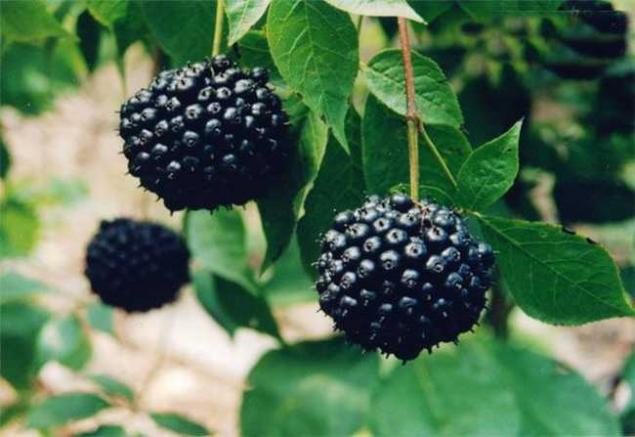467
Siberian ginseng. As increased stamina of Soviet cosmonauts
An adaptogen is a term that means a substance that helps the body cope with stress. Today falls into this category a number of herbs. But originally the term was invented for Siberian ginseng. /epochtimes.ru/Это the designation was introduced by Soviet scientists in 1947, when studied the effect of Siberian ginseng. They were looking for a plant that will give strength and endurance to Soviet soldiers. Experiment with the soldiers was successful. Therefore, Siberian ginseng has also given to increase endurance astronauts and Soviet athletes during the Olympic games.
The correct name of this plant is Eleutherococcus senticosus (Eleutherocóccus senticósus). Although it is called ginseng, it does not belong to the genus ginseng (Panax), as is their distant relative.

Siberian ginseng grows throughout Eastern Asia. In Chinese medicine it is used for almost 2 thousand years.
But most of the current research on its properties was carried out by Russian scientists. Therefore, in the West it was called "Siberian ginseng".
In properties it resembles its distant Chinese cousin ― the real ginseng (Panax ginseng). However, the real ginseng is an expensive tool, while Siberian ginseng is relatively cheap.
In traditional Chinese medicine, Siberian ginseng is known as "qi Jia's got". It does not have cult status like a real ginseng, however, is considered a valuable plant. Doctors of Chinese medicine use it for symptoms related to the deficiency of Yang energy in the kidneys and the spleen: poor appetite, fatigue, back pain, General weakness.
Li Shizhen, a famous doctor who lived during the Ming dynasty, recommended Siberian ginseng for hernias, weak tendons and to retard aging.
Modern scientists have found new uses in the plant. In Germany it sometimes give cancer patients undergoing radiation and chemotherapy. In Russia, Siberian ginseng was given to people living in the area of radiation poisoning after the Chernobyl accident. According to studies, Siberian ginseng protects against herpes, and infections caused by yeast fungi.
Commission E, the German pharmaceutical regulatory Department has approved Siberian ginseng as a remedy for fatigue. The plant is often used in chronic fatigue syndrome. People can take Siberian ginseng to improve immunity and enhance physical endurance.
Although Siberian ginseng is sometimes included in herbal formulas for insomnia, this herb is a malingerer with a slower action. It does not give a sharp burst of energy, like caffeine. Siberian ginseng should be drunk a few weeks or months. But it has a lasting effect. It is recommended for problems with the adrenal glands and lower thyroid function.
The herbalists after a 1-2 month course of treatment with Siberian ginseng is recommended to take a break in a few weeks. Not worth it to take it continuously for more than three months. Overdose causes insomnia, severe anxiety, high blood pressure.
Recommended dose of Siberian ginseng is 100 to 300 milligrams per day. Some people can take more. Look for tinctures, where the contents of eleutheroside is at least 0.8%. If after taking the drug, you feel a little over-excited, stop taking.published
Author Conan Milner
P. S. And remember, only by changing their consumption — together we change the world! © Join us at Facebook , Vkontakte, Odnoklassniki
Source: www.epochtimes.ru/sibirskij-zhenshen-kak-povyshali-vynoslivost-sovetskih-kosmonavtov-99005005/
The correct name of this plant is Eleutherococcus senticosus (Eleutherocóccus senticósus). Although it is called ginseng, it does not belong to the genus ginseng (Panax), as is their distant relative.

Siberian ginseng grows throughout Eastern Asia. In Chinese medicine it is used for almost 2 thousand years.
But most of the current research on its properties was carried out by Russian scientists. Therefore, in the West it was called "Siberian ginseng".
In properties it resembles its distant Chinese cousin ― the real ginseng (Panax ginseng). However, the real ginseng is an expensive tool, while Siberian ginseng is relatively cheap.
In traditional Chinese medicine, Siberian ginseng is known as "qi Jia's got". It does not have cult status like a real ginseng, however, is considered a valuable plant. Doctors of Chinese medicine use it for symptoms related to the deficiency of Yang energy in the kidneys and the spleen: poor appetite, fatigue, back pain, General weakness.
Li Shizhen, a famous doctor who lived during the Ming dynasty, recommended Siberian ginseng for hernias, weak tendons and to retard aging.
Modern scientists have found new uses in the plant. In Germany it sometimes give cancer patients undergoing radiation and chemotherapy. In Russia, Siberian ginseng was given to people living in the area of radiation poisoning after the Chernobyl accident. According to studies, Siberian ginseng protects against herpes, and infections caused by yeast fungi.
Commission E, the German pharmaceutical regulatory Department has approved Siberian ginseng as a remedy for fatigue. The plant is often used in chronic fatigue syndrome. People can take Siberian ginseng to improve immunity and enhance physical endurance.
Although Siberian ginseng is sometimes included in herbal formulas for insomnia, this herb is a malingerer with a slower action. It does not give a sharp burst of energy, like caffeine. Siberian ginseng should be drunk a few weeks or months. But it has a lasting effect. It is recommended for problems with the adrenal glands and lower thyroid function.
The herbalists after a 1-2 month course of treatment with Siberian ginseng is recommended to take a break in a few weeks. Not worth it to take it continuously for more than three months. Overdose causes insomnia, severe anxiety, high blood pressure.
Recommended dose of Siberian ginseng is 100 to 300 milligrams per day. Some people can take more. Look for tinctures, where the contents of eleutheroside is at least 0.8%. If after taking the drug, you feel a little over-excited, stop taking.published
Author Conan Milner
P. S. And remember, only by changing their consumption — together we change the world! © Join us at Facebook , Vkontakte, Odnoklassniki
Source: www.epochtimes.ru/sibirskij-zhenshen-kak-povyshali-vynoslivost-sovetskih-kosmonavtov-99005005/



















